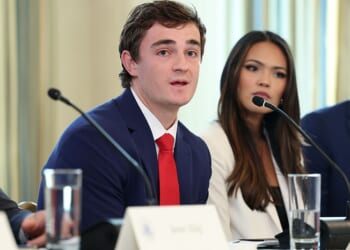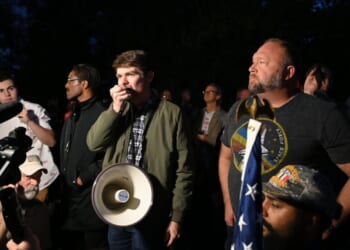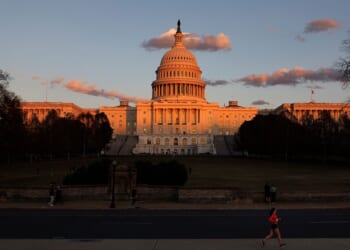The New York Times has two stories intended to convey the message that anti-Zionism is gaining ground among Jews. One is centered on Zohran Mamdani, the obsessively anti-Zionist activist leading the race for New York mayor. The other is about Gaza.
The piece on Mamdani is generally fair and interesting, because it focuses on the divide among pulpit rabbis over how far they should wade into politics. But it is related to the second story, for example when it describes one rabbi’s dilemma:
“Rabbi Neil Blumofe, the rabbi of Congregation Agudas Achim in Austin, said he rarely signs public letters and does not speak about politics from his pulpit. Still, he added his name to the one criticizing Mr. Mamdani because of what he sees as an alarming ‘zero sum game’ sentiment across the political spectrum and a sense that only Jews who identify as anti-Zionists are welcome in some liberal circles.”
Blumofe is describing “tokenism,” and it is a genuine and growing problem across all left-of-center non-Jewish institutions almost without exception—cultural organizations, public schools, universities, political organizations, media, etc.
This connects perfectly to the second story, as if the subjects in each story are talking to each other. (They probably should.) The second story admits fairly early on that its premise is false by acknowledging that “[a] majority of Jews remain emotionally and politically attached to Israel and to supporting its continued existence as a Jewish state.” When it comes to the anti-Zionist Jewish groups being profiled: “In absolute numbers, these communities are small.”
This saves us the trouble having to debunk the piece’s narrative, since the piece debunks itself. But yes—Jews are overwhelmingly in support of Israel’s right to exist, i.e. Zionism.
The part that caught my attention, however, was the discussion of a 17-year-old Jewish high-school student who “didn’t agree with the Jewish Student Union at her school, so she joined the Muslim Student Union instead.”
Later, in a discussion with the Times reporter and the student’s mother, the teenager says: “If I have kids, I’ll be raising my kids Jewish and celebrating Jewish holidays and stuff. But I don’t think that I’ll tell them, ‘Oh Israel is the place of our people.’”
She certainly might be right about what lies ahead. But she is stacking the odds against it. How does one celebrate Jewish holidays without mentioning the Jewish connection to the Land of Israel? Where do you tell your kids the Israelites were going when they escaped Pharaoh’s clutches, Portland? Where were the temple sacrifices made, Katz’s Deli? Jewish history happened where it happened, and there isn’t much you can do about that.
As her mother says to her in that interview: “But how do you square that with the ancient history that I’ve been taught—that Jews were from Israel, that all those years we wandered in the desert and then finally came back to Israel. Is all of that false?”
To which her daughter responds: “That was many, many years ago!”
Yeah, that’s kind of the point. Full commitment to Diasporist anti-Zionism requires the jettisoning of everything that happened before this moment.
But the larger obstacle to the future envisioned here is that this young lady will no doubt be spending her time with peer groups hostile to Jewish tradition and practice and history. Forget the Muslim Student Union; the Times story discusses her conversations with canvassers from Jews for Racial and Economic Justice, a progressive political group designed to reinforce her priors.
This is the problem that Rabbi Blumofe appears to put his finger on. It’s not that liberal Jews can’t or don’t exist. It’s that the structure of American politics is such that if one aligns with anti-Zionism, one is unlikely to encounter anything else. Indeed, the progressive gate-keeping has become so intense that anti-Zionism is now a litmus test for activists on any issue. It’s why climate prophetess of doom Greta Thunberg spends her time on boats challenging the Israeli navy.
The Diasporism advocated in these groups is a closed circle. As Vladimir Jabotinsky said when confronted with the argument that Jews ought to be a light unto the nations from within those nations but without a nation of their own: “England… has enriched the world with a valuable social idea: self-rule of free citizens, that is, the parliamentary government. However, how did the English nation teach other peoples to understand and run such a government? Certainly not by being scattered among the nations and convincing them; just the opposite.”
The same goes for being in groups whose entire reason for being is to critique the Jews. Embracing tokenism is a form of extreme self-exile and self-negation. The proliferation of political spaces that use anti-Zionism as their litmus test is one of the great challenges facing American Jewry. And the first step to overcoming that challenge is to acknowledge it.


















